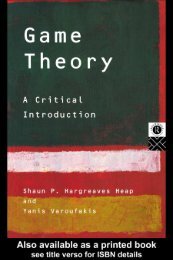handbook-executive-leadership-of-research-development-pdf-v10
handbook-executive-leadership-of-research-development-pdf-v10
handbook-executive-leadership-of-research-development-pdf-v10
You also want an ePaper? Increase the reach of your titles
YUMPU automatically turns print PDFs into web optimized ePapers that Google loves.
create a sense <strong>of</strong> urgency with respect to removing obstacles to excellent <strong>research</strong>supervision and changing established practices that undermine the quality <strong>of</strong> thepostgraduate experience.What it means in practiceReframe student recruitment and retention strategiesNew <strong>research</strong> universities face special challenges in attracting talented studentsinto postgraduate programs. Some successful universities develop their recruitmentstrategies around particularly innovative approaches to postgraduate <strong>research</strong>training, appealing to students looking for an alternative to traditional models. Theyalign the recruitment program with the <strong>research</strong> goals. These successful institutionsavoid simply mimicking established <strong>research</strong>-intensive universities and seek to createan approach that confirms the overall distinctiveness <strong>of</strong> their mission. In the longerterm this will require a constant cycle <strong>of</strong> renewal to capitalise on the appeal <strong>of</strong> newapproaches and new horizons: a reality that should be acknowledged in keepingwith the notion <strong>of</strong> a plan as a ‘living’ document.Recruiting is not just about marketing, it is specifically targeted at attracting studentswho will value being part <strong>of</strong> team making a difference in an area <strong>of</strong> enquiry aboutwhich they are passionate. For universities aiming to raise and sustain the quality<strong>of</strong> the <strong>research</strong> student cohort, this means identifying the factors that influence thechoices <strong>of</strong> potential students as they relate to the specific <strong>research</strong> goals <strong>of</strong> theuniversity. It also means providing a unified and purposeful approach combiningthe strengths <strong>of</strong> the supervisor, department and university with the promise <strong>of</strong> strongsupport systems and a sense <strong>of</strong> belonging to a leading <strong>research</strong> community.Scholarships and awards schemes are a highly effective way <strong>of</strong> supporting targetedrecruitment and retention <strong>of</strong> outstanding postgraduates. They should be reinforcedby a clear emphasis in the wider benefits <strong>of</strong> being part <strong>of</strong> the new or renewedmission <strong>of</strong> the university. Examples <strong>of</strong> these include philanthropic, business andindustry sponsored scholarships around specific themes aligned with the <strong>research</strong>goals. However, in line with the view that excellence in <strong>research</strong> should be supportedwherever it is found in the university, tagged central funds should also be availableto support exceptional candidates in any field <strong>of</strong> study. Finally, the approach torecruitment will need to be renewed with a highly pr<strong>of</strong>essional evidence-based80 A <strong>handbook</strong> for <strong>executive</strong> <strong>leadership</strong> <strong>of</strong> <strong>research</strong> <strong>development</strong>



